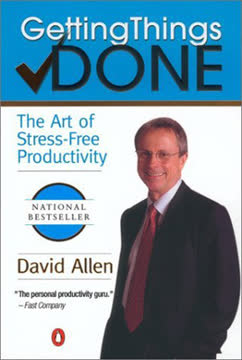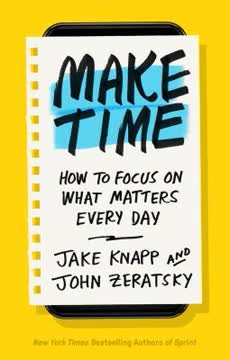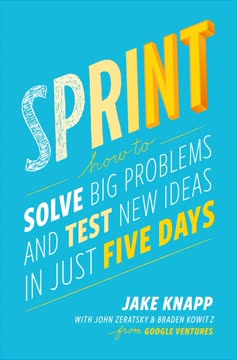Key Takeaways
1. Choose a daily Highlight to prioritize what matters most
What will be the highlight of your day?
Set a single intention. Each morning, choose one activity to prioritize as your Highlight. This could be an important work task, a personal project, or simply something you want to do. By proactively selecting a focal point, you ensure you spend time on what matters most to you, rather than reacting to other people's priorities.
Use three criteria to choose:
- Urgency: What's the most pressing thing you need to do today?
- Satisfaction: Which task will bring you the most satisfaction when completed?
- Joy: What activity will bring you the most happiness?
Aim for your Highlight to take 60-90 minutes. This provides enough time to get into a flow state without being overwhelming. Write down your Highlight to increase the likelihood of accomplishing it. Remember, perfection isn't required - simply choosing a Highlight helps redirect your focus and energy towards what's truly important to you.
2. Redesign your relationship with technology to beat distractions
Don't wait for technology to give back your time.
Take control of your devices. Modern technology is designed to be addictive and distracting. To regain focus, you must proactively redesign your relationship with devices and apps. Start by creating a "distraction-free" phone:
- Delete social media apps, games, and other Infinity Pools
- Remove email and disable notifications
- Keep only essential, non-distracting apps
Create barriers to distraction:
- Log out of addictive websites and apps
- Use browser extensions to limit time on distracting sites
- Schedule specific times for email and social media
By making distractions harder to access, you reduce the need for constant willpower. This allows you to channel your energy into making time for what truly matters, rather than wasting it on mindless scrolling and reacting to notifications.
3. Boost your energy by adopting hunter-gatherer habits
Act like a caveman to build energy.
Align with your evolutionary roots. Our bodies and brains are still wired for the hunter-gatherer lifestyle of our ancestors. By incorporating elements of this lifestyle into your modern routine, you can significantly boost your energy and focus.
Key hunter-gatherer habits to adopt:
- Move frequently: Walk, stretch, or exercise for at least 20 minutes daily
- Eat real food: Focus on whole, unprocessed foods like vegetables, fruits, nuts, and lean meats
- Prioritize face-to-face interactions: Spend time with friends and family in person
- Get outside: Exposure to nature reduces stress and improves cognitive function
- Sleep in a dark, quiet environment: Create a cave-like bedroom for better rest
Remember, you don't need to make drastic changes. Small shifts towards a more "caveman-like" lifestyle can have a big impact on your energy levels and overall well-being.
4. Create barriers to Infinity Pools and the Busy Bandwagon
The best way to defeat distraction is to make it harder to react.
Identify and limit Infinity Pools. Infinity Pools are apps and services with endless, algorithmic content that can suck up hours of your time. Common examples include social media, news sites, and video streaming platforms. To regain control:
- Remove Infinity Pool apps from your phone
- Use website blockers during focused work time
- Set specific time limits for using these services
Resist the Busy Bandwagon. The Busy Bandwagon is the cultural pressure to always be productive and responsive. To avoid getting caught up:
- Schedule your Highlight and protect that time
- Batch process email and small tasks
- Learn to say no to non-essential commitments
- Be slow to respond to non-urgent messages
By creating barriers to both Infinity Pools and the Busy Bandwagon, you make it easier to focus on what truly matters and avoid getting pulled into reactive patterns of behavior.
5. Optimize your environment for focus and productivity
The closed door is your way of telling the world and yourself that you mean business.
Design your space for concentration. Your physical environment plays a crucial role in your ability to focus. Make intentional changes to support deep work:
- Create a dedicated workspace: Even if it's just a corner of a room
- Remove visible distractions: Clear clutter and put away devices
- Use visual cues: A closed door or noise-canceling headphones signal "do not disturb"
Adjust your digital environment:
- Clear your computer desktop
- Close unnecessary browser tabs and applications
- Use focus mode or full-screen features on your devices
Optimize for energy:
- Ensure proper lighting, ideally with access to natural light
- Maintain a comfortable temperature
- Consider using a standing desk or active sitting options
By thoughtfully designing both your physical and digital environments, you create an atmosphere conducive to sustained focus and productivity.
6. Use caffeine strategically to maintain steady energy
Wake up before you caffeinate.
Time your caffeine intake. Caffeine can be a powerful tool for maintaining energy and focus, but it's easy to fall into suboptimal habits. To use caffeine more strategically:
- Delay your first cup: Wait 60-90 minutes after waking to allow natural cortisol levels to peak
- Avoid afternoon crashes: Have your last caffeinated beverage 8-10 hours before bedtime
- Consider lower-dose options: Try green tea for a more balanced energy boost
Experiment with caffeine tactics:
- Caffeine napping: Drink coffee, then take a 15-20 minute nap for a powerful recharge
- Caffeine fasting: Occasionally skip caffeine to reset your tolerance
- Pair with your Highlight: Time your caffeine intake to coincide with your most important task
Remember, everyone's caffeine sensitivity is different. Pay attention to how it affects your energy and sleep, and adjust accordingly. The goal is to use caffeine as a tool to support your focus and productivity, not as a crutch to push through exhaustion.
7. Reflect daily and fine-tune your approach with small experiments
You are a sample size of one, and your results are the only results that really matter.
Track your progress. At the end of each day, take a few minutes to reflect on how well you implemented the Make Time strategies. Ask yourself:
- Did I make time for my Highlight?
- How was my energy level throughout the day?
- Which tactics worked well? Which didn't?
- What am I grateful for today?
Embrace experimentation. Treat Make Time as a series of personal experiments. Not every tactic will work for everyone, so it's crucial to find what works best for you.
- Try one new tactic at a time
- Give each experiment at least a few days
- Be specific in your observations
- Adjust and refine based on your results
By consistently reflecting and experimenting, you'll develop a personalized system that helps you make time for what matters most. Remember, small shifts can create big results over time. The goal isn't perfection, but rather continuous improvement in how you manage your time, energy, and attention.
Last updated:
FAQ
What's "Make Time: How to Focus on What Matters Every Day" about?
- Focus on Priorities: "Make Time" by Jake Knapp and John Zeratsky is about creating more time in your day for the things you care about by focusing on your priorities.
- Framework for Time Management: The book introduces a framework that consists of four steps: Highlight, Laser, Energize, and Reflect, which are repeated daily.
- Not About Productivity: Unlike traditional productivity books, it emphasizes making time for meaningful activities rather than just getting more done.
- Overcoming Distractions: It addresses the challenges of modern distractions like technology and busy schedules, offering strategies to overcome them.
Why should I read "Make Time"?
- Practical Strategies: The book provides practical, actionable strategies to help you focus on what truly matters in your life.
- Relatable Authors: Written by former tech industry professionals, the authors share relatable experiences and insights into managing time effectively.
- Improved Well-being: By following the book's framework, readers can expect to feel less busy, more focused, and enjoy their daily lives more.
- Customizable Approach: The tactics are designed to be flexible and adaptable to individual lifestyles, making it suitable for anyone looking to improve their time management.
What are the key takeaways of "Make Time"?
- Highlight Your Day: Start each day by choosing a single activity to prioritize, ensuring you focus on what matters most.
- Beat Distractions: Use tactics to minimize distractions from technology and other interruptions to maintain focus.
- Energize Your Body: Take care of your body to recharge your brain, enhancing your ability to focus and be present.
- Reflect and Adjust: Regularly reflect on your day to identify what worked and what didn’t, allowing you to fine-tune your approach.
How does the "Highlight" step work in "Make Time"?
- Choose a Focal Point: Begin each day by selecting a single activity or task that will be the highlight of your day.
- Criteria for Selection: Use urgency, satisfaction, or joy as criteria to choose your highlight, ensuring it aligns with your priorities.
- Commitment to Completion: Make a commitment to complete your highlight, even if it requires breaking it into smaller tasks.
- Proactive Mindset: This step encourages a proactive approach to your day, helping you focus on what truly matters.
What is the "Laser" step in "Make Time"?
- Focus on the Present: Laser mode is about focusing your attention like a laser beam on your highlight, minimizing distractions.
- Create Barriers: Implement tactics to create barriers against distractions, such as logging out of social media or turning off notifications.
- Redesign Technology Use: Adjust how you use technology to prevent it from interrupting your focus and attention.
- Quality Time: By staying in Laser mode, you ensure higher quality time spent on your highlight, leading to better outcomes.
How can I "Energize" according to "Make Time"?
- Physical Activity: Incorporate daily exercise, even if it's just a short walk, to boost your energy levels.
- Healthy Eating: Focus on eating real, unprocessed foods to maintain steady energy throughout the day.
- Caffeine Management: Use caffeine strategically to avoid energy crashes and maintain focus.
- Rest and Quiet: Ensure you get enough sleep and take breaks from screens to recharge your brain.
What does the "Reflect" step involve in "Make Time"?
- Daily Reflection: At the end of each day, reflect on whether you made time for your highlight and how well you focused.
- Track Your Energy: Note your energy levels and the effectiveness of the tactics you used.
- Adjust Tactics: Use your reflections to adjust and improve your approach, tailoring the system to your unique needs.
- Gratitude Practice: Incorporate gratitude into your reflections to maintain a positive outlook and reinforce successful habits.
What are some of the best quotes from "Make Time" and what do they mean?
- "Most of Our Time Is Spent by Default": This quote highlights how much of our time is consumed by automatic, unintentional activities, emphasizing the need for intentionality.
- "The antidote to exhaustion is not necessarily rest...The antidote to exhaustion is wholeheartedness": This suggests that engaging fully and passionately in activities can be more rejuvenating than rest alone.
- "You can design your time by choosing where you direct your attention": This underscores the book's central theme of intentional time management by focusing on priorities.
- "It’s not about saving time. It’s about making time for what matters": This encapsulates the book's philosophy of prioritizing meaningful activities over mere efficiency.
How do the authors suggest dealing with email in "Make Time"?
- End-of-Day Email: Deal with email at the end of the day to use prime hours for more important work.
- Scheduled Email Time: Schedule specific times for checking email to prevent it from interrupting your focus.
- Slow Response: Be slow to respond to emails to prioritize your own tasks over others' demands.
- Reset Expectations: Communicate your email habits to manage others' expectations and reduce pressure for immediate responses.
What is the "Busy Bandwagon" and "Infinity Pools" in "Make Time"?
- Busy Bandwagon: Refers to the cultural norm of constant busyness, where people fill their time with endless tasks and meetings.
- Infinity Pools: Describes apps and sources of endless content, like social media and news, that can consume unlimited time.
- Default Behaviors: Both concepts highlight default behaviors that lead to distraction and stress, preventing focus on meaningful activities.
- Breaking the Cycle: The book provides strategies to break free from these defaults and regain control over your time and attention.
How can I implement "Make Time" in my daily life?
- Start Small: Begin by choosing one tactic from each step—Highlight, Laser, Energize, and Reflect—and gradually incorporate more.
- Customize Tactics: Adapt the tactics to fit your lifestyle and preferences, ensuring they are practical and sustainable.
- Track Progress: Use the reflection step to track your progress and make adjustments as needed.
- Be Patient: Allow time for the new habits to take root and be open to experimenting with different approaches.
What are some practical tips from "Make Time" for reducing distractions?
- Distraction-Free Phone: Remove social media and email apps from your phone to reduce temptation.
- Log Out: Log out of distracting websites and apps to create a barrier to access.
- Nix Notifications: Turn off non-essential notifications to minimize interruptions.
- Clear Homescreen: Keep your phone's homescreen blank to avoid visual triggers for distraction.
Review Summary
Make Time receives generally positive reviews for its practical advice on productivity and time management. Readers appreciate the book's simple framework, actionable tips, and engaging writing style. Many find it useful for prioritizing important tasks and reducing distractions, especially from technology. While some critics note that the ideas aren't entirely novel, most agree that the book presents familiar concepts in an accessible and motivating way. Some readers particularly value the authors' emphasis on personal experimentation and finding what works best for individual lifestyles.
Similar Books







Download PDF
Download EPUB
.epub digital book format is ideal for reading ebooks on phones, tablets, and e-readers.






